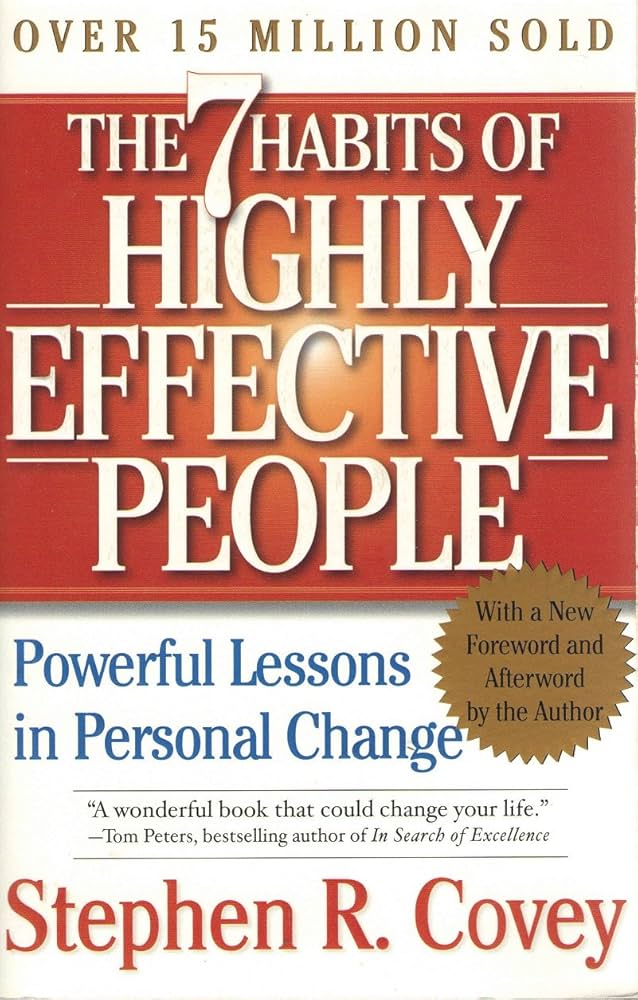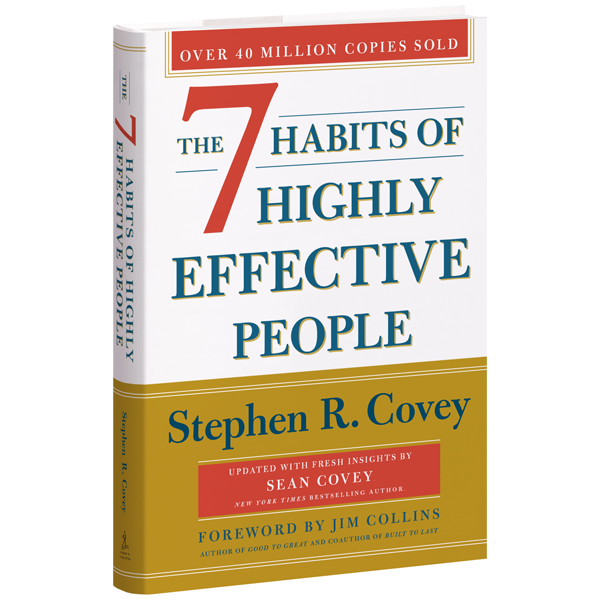The 7 Habits of Highly Effective People: A Timeless Classic and its Impact

Stephen R. Covey’s “The 7 Habits of Highly Effective People” transcends the realm of a simple self-help book; it’s a principle-centered approach to personal and professional effectiveness that has resonated with millions for over three decades. This enduring popularity stems from its focus on timeless principles rather than fleeting trends, offering a roadmap for achieving lasting success in all aspects of life. This article will explore the book’s core tenets, its enduring legacy, and its relevance across various facets of society, drawing connections to topics like books, authors, reading, libraries, and cultural impact.
The Seven Habits: A Principle-Centered Framework
The book’s core lies in its seven habits, presented as a sequential, interconnected system designed to foster personal and professional growth. These habits are not merely techniques; they are deeply rooted in ethical principles, emphasizing character development as the foundation for lasting achievement. The seven habits are:

Habit 1: Be Proactive
This habit emphasizes taking responsibility for one’s life and choices. It’s about focusing on what we can control—our responses, attitudes, and actions—rather than being reactive to external circumstances beyond our influence. Proactivity involves choosing our responses and shaping our own destiny, rather than being a victim of circumstances.
Habit 2: Begin with the End in Mind
This habit stresses the importance of vision and long-term planning. Before embarking on any endeavor, we should envision our desired outcome and work backward to formulate a plan that aligns with our ultimate goals. This involves clarifying our values and setting meaningful objectives that guide our actions. The classic exercise of writing one’s own obituary is a powerful tool Covey uses to illustrate this habit.
Habit 3: Put First Things First

This habit focuses on effective time management and prioritization. It urges us to identify and focus on tasks that truly matter—those that contribute to our long-term goals—rather than getting bogged down in urgent but less important activities. This involves mastering prioritization techniques to effectively manage our time and energy.
Habit 4: Think Win-Win
This habit emphasizes collaboration and mutual benefit. It advocates for finding solutions that satisfy the needs of all parties involved, moving beyond win-lose scenarios to create synergistic relationships built on trust and respect. This habit promotes a cooperative mindset, focusing on collaboration and mutual success.
Habit 5: Seek First to Understand, Then to Be Understood
Effective communication is central to this habit. It promotes empathetic listening, emphasizing the importance of truly understanding another person’s perspective before attempting to convey our own. This leads to more meaningful interactions and greater influence, based on genuine understanding.

Habit 6: Synergize
This habit champions creative collaboration and leveraging diversity. It highlights the power of teamwork, emphasizing that together we can achieve far more than the sum of our individual efforts. By embracing differences and working collaboratively, we can find innovative and effective solutions.
Habit 7: Sharpen the Saw
Continuous self-renewal is the focus of this habit. It emphasizes the importance of physical, mental, social, and spiritual renewal to maintain balance and peak performance. This habit promotes ongoing self-improvement, encouraging activities that enhance our well-being and effectiveness.
The 30th Anniversary Edition: A Modern Perspective
The 30th Anniversary Edition of “The 7 Habits” builds upon the original work by incorporating insightful reflections from Sean Covey, Stephen Covey’s son. These additions provide a contemporary lens through which to view the timeless principles, offering practical applications and relevant examples for navigating the complexities of the modern world. This updated edition ensures the book’s enduring relevance for a new generation of readers.
The Book’s Genre and Classification: A Bibliographic Perspective
“The 7 Habits of Highly Effective People” falls under several genres, including self-help, personal development, and business management. Its classification as a classic within the self-help genre is undeniable, given its sustained popularity and impact over several decades. Its enduring appeal elevates it beyond a mere bestseller; it’s a foundational text for those seeking personal and professional growth. Numerous book reviews, across various platforms, consistently praise its wisdom and practicality.
Stephen R. Covey and Sean Covey: Authorial Influence
Stephen R. Covey’s expertise in leadership and organizational development significantly shaped the book’s profound impact. His principle-centered approach is a departure from purely skills-based self-help methodologies, fostering a deeper, more lasting change in individuals and organizations. Sean Covey’s contributions in the 30th Anniversary Edition further solidify the book’s relevance, bridging the gap between the original principles and contemporary challenges. The authors’ biographies, writing styles, and inspirations all contribute to the book’s unique and lasting appeal. Their famous works extend beyond “The 7 Habits,” demonstrating a consistent focus on principle-centered living and leadership.
Reading Habits and Educational Value: A Learning Perspective
The book’s lasting influence is partly due to its readability and structure. Covey uses clear, concise language, supported by relatable anecdotes, making complex concepts accessible to a wide audience. Summaries and paraphrases of the seven habits are readily available, catering to different learning styles. The book offers substantial educational value, providing life lessons applicable to various life stages and professional contexts.
Libraries and Archives: Preservation of a Cultural Artifact
The book’s presence in public and digital libraries reflects its significance as a cultural artifact. The inclusion of “The 7 Habits” in various collections underscores its sustained relevance and ongoing impact on society. Its accessibility through various platforms, ensures its continued reach to diverse audiences, preserving its value for future generations. The book’s influence on thought and action might well place it in future rare book collections or archives as a seminal work of self-help literature.
Cultural Impact and Literary Influence: A Societal Perspective
“The 7 Habits of Highly Effective People” has transcended its initial audience, influencing individuals and organizations across the globe. Its principle-centered approach has sparked numerous adaptations and applications in diverse fields, from education and parenting to business and leadership training. Awards and recognition have further cemented its place in popular culture, demonstrating its widespread influence. Communities and forums dedicated to the seven habits exemplify its sustained impact, with ongoing discussions and interpretations of its core principles. The book’s literary influence is evident in the countless books, articles, and presentations that reference or build upon Covey’s principles. The book’s impact on leadership styles, organizational structures, and personal development strategies continues to be felt today, making it a significant cultural touchstone.
In conclusion, “The 7 Habits of Highly Effective People” remains a compelling and enduring work, profoundly impacting various aspects of society. Its focus on timeless principles, combined with its accessibility and insightful commentary in the 30th Anniversary Edition, continues to resonate with readers seeking personal and professional growth and lasting fulfillment.